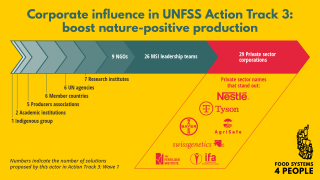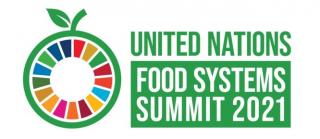A Call for Inclusion and Sovereignty at the UN Food Systems Summit
By Allison Hess
In a few days, the UN will convene people virtually from around the world for a Food Systems Summit aimed at transforming food systems globally to achieve the Sustainable Development Goals. In 2015, the UN set 17 Sustainable Development Goals (SDGs) as part of the 2030 Agenda for Sustainable Development, with the aim that these goals would be achieved within the next 15 years. With progress encountering huge setbacks during the pandemic, this Summit aims to accelerate action to get the world back on track.
The 2030 Agenda presents a diverse set of goals that are unique but, importantly, mutually reinforcing. This Food Systems Summit affirms how food systems connect with each of the 17 goals. The term “food systems” refers to all aspects of how food is grown, processed, and consumed. Whether we like it or not, the food that most of us regularly eat is part of a global network of production and trade.
The UN recognizes the current global food system is in an unsustainable and inequitable crisis: One third of food produced for human consumption is lost or wasted every year, while around one tenth of the world’s people are hungry. Industrial and unsustainable practices mean that food waste and agriculture account for 8% and 24% of global carbon emissions respectively. There is an overabundance of ultra-processed foods (more accurately “food products”) that cause malnutrition even among populations who have enough to eat. Many communities – especially those suffering from long histories of colonialism and racial oppression – have limited access to fresh, nutritious, and delicious foods that they can afford and that are culturally appropriate. Every year farmers are forced to give up their crop lands and harvest because of drought, floods, or contamination brought on by environmental abuse and climate change.
Amidst all of this, the UN aimed to convene a “People’s Summit,” to “empower all people” to contribute to the outcomes so that all perspectives can be taken into account. Unfortunately, that aim has not been realized. The Summit will take place online on September 23, during which countries will present their national commitments to transform their food systems. Earlier this summer, we posted about some of the controversy surrounding the UN Food Systems Summit (UNFSS). Specific concerns have to do with the prominence of corporate interests in setting the agenda coupled with neglect towards the needs and priorities of frontline communities. Summit preparations began in early 2020, just as COVID-19’s emergence disrupted food systems globally. The organizers decided to forge ahead with the planning process, severely limiting participation especially for those essential workers struggling to keep food systems going (who were perhaps the most important stakeholders to hear from in designing the Summit).
Descriptions of the UNFSS on its webpage refer generally to human rights goals and inclusion for all, but according to the UN Special Rapporteur on the Right to Food – appointed by the UN Human Rights Council to serve as an independent authority and advocate for human rights in relation to world hunger and food systems – the Summit organizers’ commitment to considering human rights does not go beyond lip service.
At a virtual event hosted by FIAN International and Rosa-Luxemburg-Stiftung one week prior to the UNFSS, the Special Rapporteur, Michael Fakhri, spoke of what he sees as concerns with the Summit. He pointed out that the Summit treats corporations as part of the solution without holding them accountable as part of the problem. These same corporations continue to promote synthetic fertilizers, pesticides, and GMO seeds that harm soil health and biodiversity, all through a system that leaves farmers in agonizing debt. Michael Fakhri described the Summit process as being disconnected from reality and from the struggles of communities on the frontlines of the food systems crisis – the poor and hungry as well as small-scale and landless farmers, workers, Indigenous peoples, peasants, women, and fisherfolk.
The Special Rapporteur noted that the Summit promotes a very narrow understanding of science. There has been an emphasis throughout the UNFSS process on innovation, markets, and technology while neglecting wisdom from those at the grassroots, especially from Indigenous communities. The UNFSS is missing a critical opportunity to root solutions in an agroecology framework, which teaches that science should use that traditional knowledge as a starting point, learning from those who have understood for generations how to cultivate a sustainable relationship with the land and its gifts.
A key issue with the UNFSS is its framework of multistakeholderism, which – as a briefing note from FIAN International (PDF) points out – puts everyone under an umbrella of “stakeholder” while obscuring “crucial differences in the rights, interests, roles, responsibilities, and legitimacy of the diverse actors.” In the case of the UNFSS and its Pre-Summit in July, the perspectives of those most affected by the global food systems crisis get overridden by powerful multinational corporations whose influence has dominated the Summit’s agenda from the start.
A recent open letter to UN Secretary-General (PDF) António Guterres conveyed serious concerns that “the foreseen outcomes of the summit could critically undermine the ability of UN bodies to guide food system reform,” and “threaten the ability of the UN system to maintain trust and buy-in of many food system actors,” notably by circumventing existing democratic mechanisms like the Committee on World Food Security.

Amid all these concerns, frontline communities have converged in countermobilizations (such as the People’s Autonomous Response to the UNFSS and Global People’s Summit for Just, Equitable, Healthy and Sustainable Food Systems) outside the UNFSS to discuss the solutions and changes they demand. An interfaith “Faith + Food Coalition” convened by the Center for Earth Ethics hosted a series of dialogues for faith communities in the lead-up to the Pre-Summit. The Unitarian Universalist Association Office at the UN (UU@UN) has been proud to be part of this interfaith community calling for specific change to the global food systems through that coalition’s resulting Faith + Food UNFSS Dialogues Interfaith Statement. It articulates shared principles in a call for Heads of State and Government at the UNFSS to take 11 specific actions “to align their countries’ production and consumption to sustainable, regenerative outcomes, centered in equity and care for the most vulnerable.”
For Unitarian Universalists, this year is significant for engagement with these issues of food justice and building more equitable, more sustainable food systems. In April, the UU@UN hosted its Intergenerational Seminar in coalition with UU Ministry for Earth on the theme “All In for Climate Justice: Food Equity and Sustainability,” and this theme will be carried through in congregations around the U.S. and Canada during United Nations Sunday services this fall. The Seminar take-aways and UN Sunday resources affirm a similar message to what we see in the complexities surrounding the UNFSS, namely:
- Food systems as they currently exist globally are overly harmful to people and planet
- The solutions to create more equitable and more sustainable food systems must come from those with lived experience on the frontlines
- Solutions that honor traditional knowledge, human rights, and food sovereignty are often also effective solutions that address climate change.
Congregations are urged to delve deep into these issues by hosting a UN Sunday worship service and also by using this opportunity to take action. The UN Sunday resources online provide information about UU connections with the UN and the 2021-22 theme, suggested local action congregations can take on and around UN Sunday, and materials for planning a worship service and religions education activities. Together as Unitarian Universalists, and in solidarity with peasant and indigenous organizers and our interfaith partners around the world, we can move the world closer to one with equitable and sustainable food systems for all.
Read More About the UNFSS, Controversy, and Resistance
- “UN Food Systems Summit marginalizes human rights and disappoints, say experts” in ReliefWeb, press release from UN Human Rights Council, September 22, 2021.
- Author: Michael Fakhri, Special Rapporteur on Right to Food. David Boyd, Special Rapporteur on human rights and the environment. Olivier de Schutter, Special Rapporteur on extreme poverty and human rights.
- “Meat industry pushes UN food summit to back factory farming” in Unearthed from Greenpeace UK, September 21, 2021.
- Author: Zach Boren, investigative journalist for Greenpeace’s Unearthed.
- “Open Letter to UNSG Re: UN Food Systems Summit (PDF)” from Committee on World Food Security, September 10, 2021.
- Authors: Olivier De Schutter, UN Special Rapporteur on Extreme Poverty and Human Rights, former UN Special Rapporteur on the Right to Food (2008-2014), Co-chair of IPES-Food. Michael Fakhri, UN Special Rapporteur on the Right to Food. Thanawat Tiensin, Chair, Committee on World Food Security (CFS). Martin Cole, Chair, High Level Panel of Experts on Food Security and Nutrition (HLPE)
- “UN food systems summit leaders must not remain silent on its inadequate rules of engagement with commercial actors” in The BMJ Opinion; September 1, 2021.
- Authors: Nicholas Nisbett, Leader, Health and Nutrition Cluster, Institute of Development Studies at the University of Sussex. Kent Buse, Director, Healthier Societies Program, The George Institute for Global Health. Jeff Collin, Professor of Global Health Policy, University of Edinburgh & SPECTRUM research consortium. Lesli Hoey, Associate Professor, Urban and Regional Planning Program, Sustainable Food Systems Initiative, University of Michigan. Lucy Westerman, Policy and Campaigns Manager, NCD Alliance.
- “Thousands mobilize to call for food systems that empower people, not companies” from La Via Campesina, August 5, 2021.
- “Here is why we are boycotting the UN Food Systems Summit” in Aljazeera Opinion, July 25, 2021.
- Authors: Elizabeth Mpofu, Small-scale organic peasant farmer from Zimbabwe. Edgardo Garcia, Peasant leader from the Nicaragua Land Workers’ Association.
- “The UN Food Systems Summit: How Not to Respond to the Urgency of Reform” in IPS Opinion, March 22, 2021.
- Authors: Michael Fakhri, current UN Special Rapporteur on the Right to Food. Hilal Elver, UN Special Rapporteur on the Right to Food from 2014-2020. Olivier De Schutter, UN Special Rapporteur on the Right to Food from 2008-2014, current UN Special Rapporteur on Extreme Poverty and Human Rights, and co-chair of IPES-Food.
Coalition Statements and Reports re: Food Systems Summit
- Africa responds to the UN Food Systems Summit: “Let’s reclaim our food sovereignty and reject the industrial food system”
- Political Declaration from the People’s Counter-Mobilization to Transform Corporate Food Systems: “No to Corporate Food Systems. Yes, to Food Sovereignty!” (pdf)
- Faith + Food UNFSS Dialogues “Interfaith Statement”
- Interim report from the Special Rapporteur on the right to food, Michael Fakhri: “The right to food”
